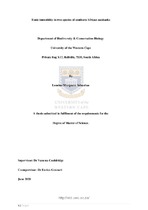| dc.contributor.advisor | Couldridge, Vanessa | |
| dc.contributor.author | Sebastian, Lemόne Margeaux | |
| dc.date.accessioned | 2021-04-08T09:45:19Z | |
| dc.date.available | 2021-04-08T09:45:19Z | |
| dc.date.issued | 2020 | |
| dc.identifier.uri | http://hdl.handle.net/11394/8162 | |
| dc.description | Magister Scientiae (Biodiversity and Conservation Biology) - MSc (Biodiv and Cons Biol) | en_US |
| dc.description.abstract | Tonic immobility (TI) can be defined as an unlearned behavioural response described by a physical state of immobility. This behaviour can last from a few seconds up to several hours. Tonic immobility in sharks has not been investigated extensively, despite being observed and used widely. Due to this limited research, there is still uncertainty about the significance of this response, especially in smaller shark species. Anecdotal evidence suggests that females may enter a tonic state during courtship, but this has never been scientifically investigated. Alternatively, tonic immobility may function as an anti-predator response. The aim of this study was thus to examine the behaviour and physiology associated with tonic immobility in two closely related species of catshark, Haploblepharus edwardsii and Haploblepharus pictus, and to test for differences between males and females (if the evolutionary significance of TI was related to courtship), and between the two species (if TI evolved in response to species-specific drivers). | en_US |
| dc.language.iso | en | en_US |
| dc.publisher | University of Western Cape | en_US |
| dc.subject | Tonic immobility | en_US |
| dc.subject | Catsharks | en_US |
| dc.subject | Duration | en_US |
| dc.subject | Induction | en_US |
| dc.subject | Respiration | en_US |
| dc.subject | Heart rate | en_US |
| dc.title | Tonic immobility in two species of Southern African catsharks | en_US |
| dc.rights.holder | University of Western Cape | en_US |

